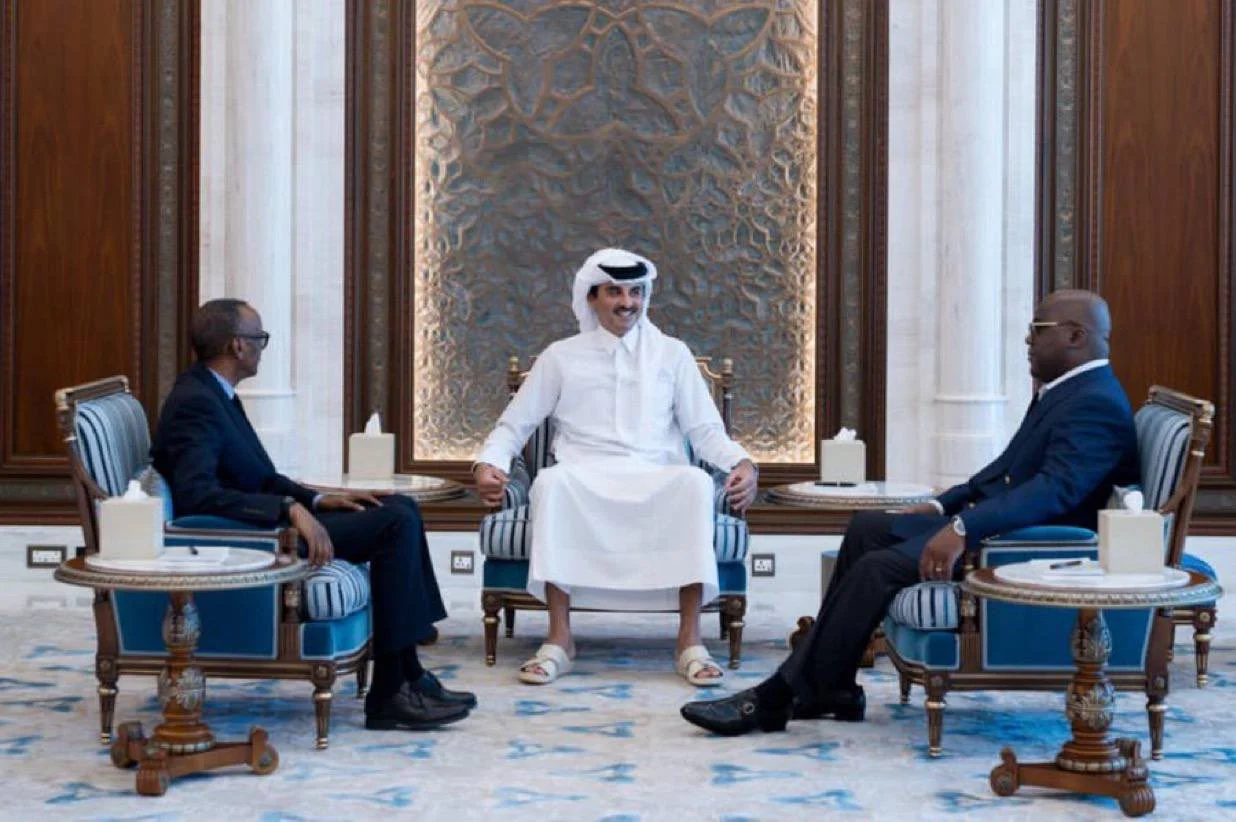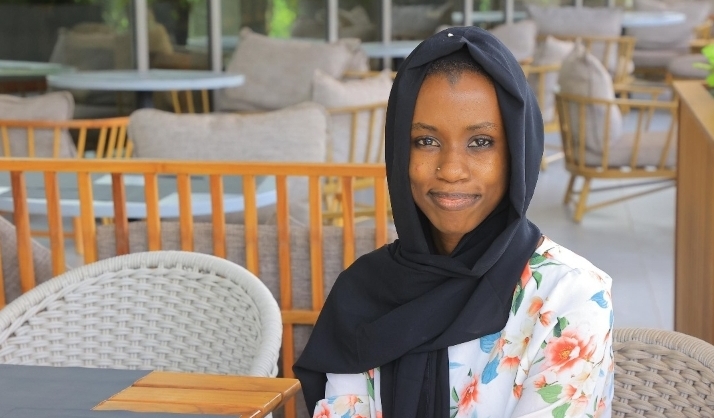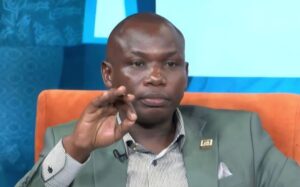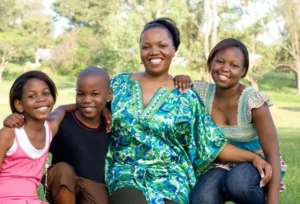News
The High Stakes Behind Kagame and Tshisekedi’s Talks in Doha

Rwandan President Paul Kagame and his Congolese counterpart Félix Tshisekedi met in Doha on Tuesday in a significant diplomatic breakthrough mediated by Qatar’s Emir Sheikh Tamim bin Hamad Al Thani.
The meeting, held at Lusail Palace, marked the first time in months that the two leaders sat across from each other, despite the worsening conflict in eastern DR Congo and growing international pressure.
For over two years, relations between Kigali and Kinshasa have been marked by open hostility, with Tshisekedi accusing Rwanda of backing the M23 rebel group, which has seized strategic towns in North Kivu province.
Kagame has denied the allegations and, in turn, pointed to the presence of the Democratic Forces for the Liberation of Rwanda (FDLR), a militia with links to the perpetrators of the 1994 Rwandan genocide, as a persistent security threat to Rwanda.
Attempts by other African leaders, including Angola’s President João Lourenço, had failed to bring the two to direct negotiations.
But Qatar succeeded where others could not, raising questions about what changed.
Kagame’s office framed the Doha meeting as a reaffirmation of support for the joint East African Community-SADC (EAC-SADC) peace process.
Rwanda also emphasized the need to address the FDLR’s presence in eastern DR Congo and ensure regional security.
Meanwhile, Qatar’s Foreign Ministry hailed the discussions as an important step toward stability in the Great Lakes region. Although no immediate resolutions were announced, the meeting reflected shifting political calculations on both sides.
The fact that Tshisekedi, who had previously likened Kagame to Adolf Hitler, agreed to the talks suggests that Kinshasa’s diplomatic posture may be evolving.
His government had largely dismissed earlier mediation efforts, opting instead for military and diplomatic isolation of Rwanda, including pushing for sanctions.
But with the situation on the ground deteriorating and M23 fighters continuing to gain territory, the Congolese leader may have found it necessary to explore other diplomatic avenues.
Rwanda, on the other hand, has faced increasing international sanctions over its alleged support for M23.
The United States, the European Union, and other Western countries have imposed restrictions on Rwandan officials, suspended military aid, and pressured Kigali to disengage from eastern DR Congo. However, these punitive measures have not altered Rwanda’s position, and M23 remains a dominant force in the conflict.
This is where Qatar’s intervention takes on added significance. Unlike Western nations, which have approached the conflict largely through the lens of punitive measures, Qatar has opted for engagement.
Its interest in mediating the crisis is not purely altruistic—it is also tied to economic stakes in both Rwanda and DR Congo.
Qatar has made substantial investments in Rwanda, including a 49% stake in RwandAir and a controlling 60% share in Bugesera Airport, which is under construction south of Kigali at a cost of at least $2 billion.
These investments make Rwanda one of Qatar’s most significant economic partners in Africa. Meanwhile, Qatar has also signaled its intent to expand its footprint in DR Congo.
After Kinshasa established an embassy in Doha, Qatar pledged to support infrastructure projects, including the renovation of N’djili and N’Dolo airports in Kinshasa and Luano Airport in Lubumbashi.
The Gulf state has also expressed interest in the construction of a deep-sea port at Banana, a venture currently led by UAE-based DP World.
With these economic interests in mind, Qatar’s diplomatic maneuvering appears to be aimed at preserving stability in a region where it is increasingly invested.
By securing a face-to-face meeting between Kagame and Tshisekedi, Qatar has positioned itself as a key broker in a crisis that has defied multiple regional and international mediation attempts.
Whether this latest diplomatic push will yield tangible progress remains to be seen. Despite the meeting in Doha, fighting in eastern DR Congo continues, and M23 has yet to commit to any major concessions.
The Congolese government still demands that Rwanda withdraw its alleged support for the rebels, while Kigali insists that the underlying causes of the conflict—including the FDLR’s presence—must be addressed.
Nonetheless, the fact that Kagame and Tshisekedi were willing to engage in dialogue after months of heightened tensions suggests that the geopolitical landscape is shifting. The failure of previous mediation efforts, the military deadlock, and the economic interests at play may have contributed to bringing the two leaders to the table.
For now, Qatar has succeeded in achieving what others could not: breaking the ice. What comes next will depend on whether the momentum from Doha can translate into lasting diplomatic engagement.

News
Conversation With Uganda’s Student Tech Pioneer: Kusiima Saruah

In a country where the youth make up the majority of the population, their voices are often overlooked in critical governance processes. But a bold new wave of innovation led by young minds is reshaping how civic participation and leadership are cultivated, starting right at the grassroots.
One such trailblazer is Kusiima Saruah Kyaligonza, a 21-year-old software developer and university student at Uganda Martyrs University, whose work caught our attention. In a recent conversation with Amiri Wabusimba, Kusiima shared her vision, journey, and the powerful potential of digital platforms to transform Uganda’s democratic future.
Inspired by the challenges she observed in university elections, including voter mistrust, low student participation, and systemic apathy, Kusiima developed a digital voting platform tailored for student elections. She aimed to rebuild faith in electoral processes, beginning within schools. “Watching the university’s elections, I saw the frustration from students.
I wanted to create a space where students feel their voices matter and their votes count,” she explained. “If we instill that mindset early, we raise a generation that demands integrity and leads with purpose.” Her platform addresses specific electoral issues such as vote rigging, low turnout, and favoritism common even in student leadership contests by promoting transparency, fairness, and accessibility.
Kusiima’s work is part of a broader movement of youth-led innovation in Uganda. “We often say the youth are the leaders of tomorrow,” she noted, “but many of us are already leading today through art, technology, advocacy, and innovation. What we need is support, not just applause.” Her initiative has been well received by fellow students, who report feeling empowered, heard, and more engaged in school governance. According to Kusiima, the impact goes beyond elections; it sows seeds of responsible leadership.
Asked whether digital voting could work on a national level, Kusiima responded with conviction. “Yes, it can if we commit to building digital literacy, infrastructure, and, most importantly, trust. Leaders must stop fearing technology and start embracing its potential.” If given a chance to address the Electoral Commission or national leaders, Kusiima says she would urge them to invest in youth innovations and adopt transparent systems that simplify civic participation without compromising credibility.
As Uganda continues to grapple with questions around electoral transparency, declining public trust in democratic institutions, and low youth participation, innovations like Kusiima Saruah’s digital voting platform couldn’t have come at a better time, especially as the country prepares for the 2026 general elections. Her initiative offers more than a technological upgrade, it’s a catalyst for cultural change in how Uganda engages its citizens from an early age. By digitizing trust, simplifying participation, and empowering youth to lead, this platform embodies the future of accountable governance.
This is not just a student project; it’s a national opportunity waiting to be embraced. It is time for Uganda’s government, Electoral Commission, civil society, and development partners to see this for what it is: a smart, scalable, homegrown solution that reflects both the challenges and the aspirations of a new generation.
If Uganda truly seeks to uphold the principles of free and fair elections in 2026 and beyond, then supporting innovations like Kusiima’s is not optional; it is essential.
-
Top Stories3 days ago
Just in: PLU leaning to NRM, Withdraws From Party Primaries With 22 days Remaining to Elections.
-
Top Stories6 days ago
Suspected female suicide bomber killed in Kalerwe
-
Top Stories6 days ago
NUP Clears Kyeyune Pafuladiito For Mubende District Chairperson Race.
-
Top Stories6 days ago
NUP Goes For Buwekula South MP Seat Blesses Edward Ssempira.
-
Top Stories3 days ago
Museveni Approves Flyover Along Kampala-Jinja Highway to Protect Mbalala Industrial Park Workers
-
Top Stories5 days ago
Uganda’s Open Currency Policy and the Decline of the Shilling
-
Top Stories5 days ago
Dr. Ssemugenyi petitions Constitutional Court over UPDF Amendment Act
-
Top Stories3 days ago
Police fire teargas and water cannon at protesters in Kenya as thousands take to the streets
















